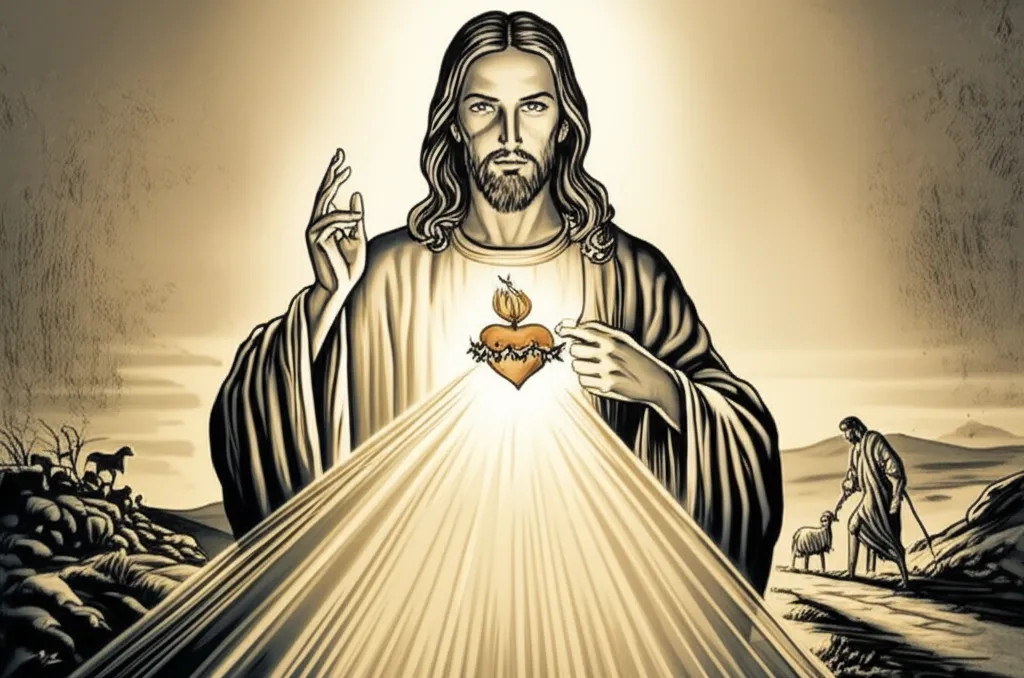Today, as we celebrate the Solemnity of the Most Sacred Heart of Jesus, we are invited to contemplate the boundless love and mercy that flows from the heart of Christ. In a world often marked by division, anxiety, and uncertainty, the readings offer a profound message of hope, reconciliation, and unwavering care. They remind us that we are not alone in our struggles; rather, we are cherished and sought after by a Shepherd who knows us intimately and loves us unconditionally.
The Shepherd's Unwavering Care
The first reading from Ezekiel paints a vivid picture of God as a caring shepherd: "I myself will look after and tend my sheep… I will rescue them from every place where they were scattered… The lost I will seek out, the strayed I will bring back, the injured I will bind up, the sick I will heal" (Ezekiel 34:11-16). This image resonates deeply in our modern lives, where many feel lost, scattered, and wounded by the challenges of daily existence. The pressures of work, the complexities of relationships, and the constant barrage of information can leave us feeling overwhelmed and disconnected. Yet, Ezekiel's words assure us that God actively seeks us out in these moments of darkness, offering healing and restoration.
This resonates with the early Christian apologists who sought to reconcile faith with reason, emphasizing that God's love is not a blind, irrational force, but a deliberate and purposeful act of seeking out and caring for each individual. Just as they saw seeds of truth in the philosophies of their time, we can find comfort in the knowledge that God's love is a constant presence, guiding us through the complexities of our lives.
The Overflowing Love of God
In the second reading, Paul speaks of the transformative power of God's love poured into our hearts through the Holy Spirit: "God proves his love for us in that while we were still sinners Christ died for us" (Romans 5:8). This is a radical statement of grace, highlighting that God's love is not contingent upon our worthiness or perfection. It is a love that embraces us in our brokenness, offering forgiveness and reconciliation.
This concept challenges the common misconception that we must earn God's love through good deeds or religious observance. Instead, Paul emphasizes that reconciliation is a gift freely given, a testament to God's boundless mercy. This understanding is crucial in a world where many struggle with feelings of inadequacy and self-doubt. Knowing that we are loved unconditionally can empower us to embrace our imperfections and strive for growth, not out of obligation, but out of gratitude for the love we have received.
Rejoicing in Reconciliation
The Gospel reading from Luke presents the parable of the lost sheep, further illustrating God's relentless pursuit of those who have strayed: "What man among you having a hundred sheep and losing one of them would not leave the ninety-nine in the desert and go after the lost one until he finds it?" (Luke 15:4). This parable is not merely a quaint story; it is a powerful reminder of God's unwavering commitment to each and every one of us. The shepherd's joy upon finding the lost sheep mirrors the joy in heaven over one sinner who repents.
This image speaks to the heart of the Christian message: that no one is beyond redemption. In a society that often marginalizes and condemns those who have made mistakes, the parable of the lost sheep offers a message of hope and inclusion. It reminds us that God's love extends to all, regardless of their past, and that repentance and reconciliation are always possible.
Living Out the Sacred Heart
As we celebrate the Solemnity of the Most Sacred Heart of Jesus, let us reflect on the profound implications of these readings for our daily lives. We are called to emulate the love and compassion of the Good Shepherd, seeking out those who are lost, injured, and in need of healing. This may involve reaching out to a friend who is struggling, volunteering in our community, or simply offering a listening ear to someone who feels alone.
Moreover, we are invited to embrace the gift of reconciliation, both with God and with one another. This requires humility, forgiveness, and a willingness to let go of past hurts. By opening our hearts to God's love, we can become instruments of healing and reconciliation in a world that desperately needs it.
The readings today invite us to dwell on the immense love that God has for each of us. It is a love that seeks us out, heals our wounds, and rejoices in our return. May we, in turn, reflect this love in our interactions with others, becoming beacons of hope and compassion in a world that is often dark and uncertain.
